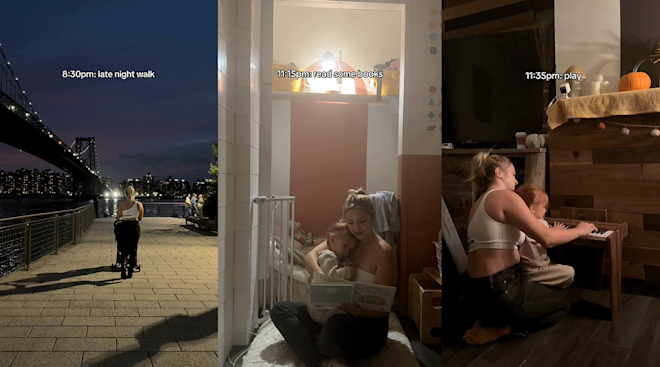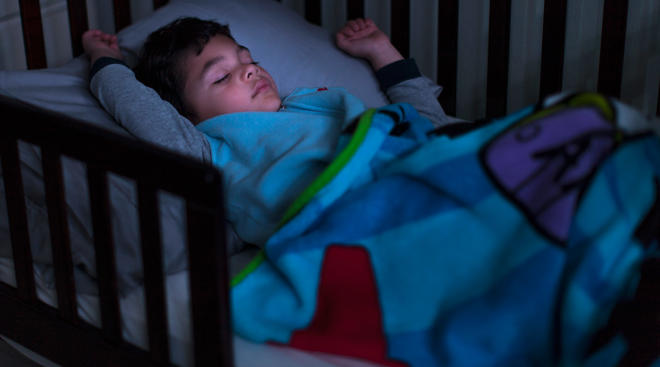Real Parents on Revenge Bedtime Procrastination (and How to Stop the Cycle)
Revenge bedtime procrastination, or intentionally staying up late to reclaim unavailable time during the day, can be a parent’s best friend and worst enemy. I, for one, am guilty of it from time to time (read: often). Spending extra time doing literally whatever I want (aka watching Netflix with my husband) at the end of a long day is a delicious indulgence. In a life where “me time” or “us time” is hard to come by, it’s easy to see why revenge bedtime procrastination is common among parents.
However, despite the temporary thrill, this tempting habit tends to have not-so-great consequences over time. Below, sleep experts, mental health specialists and real parents share insights into revenge sleep procrastination and its downfalls—plus, how parents can break the cycle.
Revenge bedtime procrastination is when people stay up late as an act of rebellion against their overtaxed days. And suffice it to say it’s common among new parents whose days are consumed by diapers, feedings and soothing sessions. But, when we sacrifice sleep for “me time,” it can result in sleep deprivation, which can affect our physical and mental wellbeing in all sorts of alarming ways, according to Sleep Foundation.
Staying up late scrolling (or researching vacations, or online shopping) is an understandable attempt to soak up some extra relaxation, but it can become a vicious cycle. For busy parents who can’t carve that time into their daytime hours, “an unconscious resentment can build,” explains Charles Sweet, MD, MPH, a board-certified psychiatrist and medical advisor for Linear Health, a mental health platform based in Austin, Texas. “Seemingly, the only way to claim that time is to sacrifice sleep, and many people choose to do so.”
After I had my first son, I would stay up way too late watching TV. It just felt so good to check out and finally have time that was mine. But it started catching up to me. I felt it the next day, and once I had my second child, that habit became completely unsustainable.
The causes of revenge bedtime procrastination aren’t a mystery: Simply put, modern parents spend all day running around; we need to reclaim some time after our kids go to sleep. “Even when people are aware of the tradeoff between sleep and entertainment, self-control is often so worn down by the end of the day that the short-term satisfaction wins out over our body’s need for sleep,” says Sweet. “It’s a stress response, and the word ‘revenge’ is used because there’s an element of taking back time that was stolen by the day.” Lindsy A., mom of two in Massillon, Ohio, can relate: “When every hour of your day seemingly belongs to someone else, stealing even an hour for yourself feels like a tiny victory,” she says.
Bad news, bedtime procrastinators: Even the temporary, short-term effects of revenge sleep procrastination aren’t so pretty. According to Sweet, sleep deprivation “negatively affects mental acuity, like memory and decision-making. Irritability, anxiety and depression become more likely.” Feeling irritable all day makes us crave more decompression at the end of the night—and it becomes a vicious cycle. Plus, if you’re dealing with night wakings or the dreaded split nights, you’re getting yourself into even more of a sleep-deprived pickle.
Worse yet, sleep science informs us that habitual revenge sleep procrastination is ill-advised for your long-term health and wellbeing. It can lead to chronic sleep deprivation, which has a whole host of side effects. “The immune system can weaken, and even the cardiovascular system can become susceptible to problems,” says Sweet. All of this when we’re already frazzled and stretched thin as can be as new parents!
So how can us exhausted parents step off the revenge bedtime procrastination treadmill and still get our daily fix of rest and relaxation? We explore ideas from real parents and experts below.
Stick to a set bedtime (for yourself)
Set some boundaries with yourself around bedtime and how many hours of sleep you get per night. “Develop a routine and stick to it. Having a set bedtime is crucial, and having a screen-free wind-down before your bedtime makes a huge difference in falling asleep quickly,” says Sweet.
With a firm bedtime in place, you can commit to nightly decompression time—just a bit less of it. “Breaking the habit was the hardest part for me,” says Lauren Barth, mom of three and associate content director at The Bump. “Once I got into the groove of a 9 p.m. bedtime, I began looking forward to the simplicity of my routine. I get an hour or so of reading in before my eyes can’t stay open any longer, and then I’m out. I’ve realized that sleep is my love language to myself.”
That’s not to say you can’t occasionally enjoy a “cheat day.” On weekend nights, you can hopefully stay up later but still get the sleep you need (if sleeping in is possible in your household).
Prioritize your kids’ sleep
To reclaim some time in the evenings, Meg O., mom of four in Mount Vernon, New York, recommends working on your kids’ sleep hygiene and schedules. Although this is often easier said than done, she says it’s been the key to her guilt-free evening indulgences: “At the end of the day, I know that 95 percent of the time I’m going to get a predictable seven to eight hours of sleep because my kids are.”
Carve out time for yourself during the day
Peppering in some downtime earlier in the day can help you fill your self-care cup before evening hits. “Your calendar is a powerful tool,” says Sweet. “Mark some time you need for yourself. Set your boundaries and communicate them to those who’ll need to respect them.” Alex P. agrees: “If I notice those late-night urges creeping in more often, I take it as a sign that my body and mind are craving more ‘me time,’ and I make an effort to carve out small blocks for myself during the day.”
Exercise more
Regular exercise can feel like a tall order for a tired new parent. However, routinely moving your body can lower your stress levels and help you feel sleepier in the evenings. After a hip-hop fitness sesh, my body’s fatigue overrides my brain’s request for “just one more episode” (which, I suppose, is for the best). And, as a bonus, exercise improves the quality of your sleep—a win-win for chronically sleep-deprived parents!
Frequently Asked Questions
How do I know if I’m engaging in revenge sleep procrastination?
Revenge sleep procrastination involves an attitude of “reclaiming your night” after an overtaxed day, despite feeling too tired to do so. When you’re intentionally stretching out your evenings and frequently getting less than seven to nine hours of sleep per night, you’re in the revenge sleep procrastination territory. If you’re staying up late out of principle despite feeling super tired, that’s another sign.
Is revenge bedtime procrastination common with ADHD?
Yes, says Cheryl Groskopf, LMFT, LPCC, an anxiety, trauma and attachment therapist based in Los Angeles. “People with ADHD use up a lot of their energy during the day just trying to keep up. Their brain is going fast, their feelings are loud, and their attention is bouncing all over,” she says. “So when it’s finally nighttime, and everything is quiet, their brain says, ‘Finally. I can do what I want.’”
What’s the difference between revenge bedtime procrastination and bedtime procrastination?
The difference between revenge bedtime procrastination and bedtime procrastination is the emotion behind it. Both involve putting off bedtime, but while bedtime procrastination is usually unintentional, revenge bedtime procrastination has an air of purposeful rebellion to it. “It’s a way of fighting back against a day that felt too full, too loud or too rushed,” says Groskopf.
Revenge bedtime procrastination is a guilty pleasure that can backfire on you. It pulls you in with promises of freedom and rejuvenation—and leaves you tired, cranky and miserable. As parents, we need some R&R in our days, but we have to be smart about it. Your morning self will thank you.
Please note: The Bump and the materials and information it contains are not intended to, and do not constitute, medical or other health advice or diagnosis and should not be used as such. You should always consult with a qualified physician or health professional about your specific circumstances.
Plus, more from The Bump:
Cheryl Groskopf, LMFT, LPCC, is an anxiety, trauma and attachment therapist based in Los Angeles.
Charles Sweet, MD, MPH, is a board-certified psychiatrist and medical advisor for Linear Health, a mental health startup based in Austin, Texas. He earned his medical degree from the University of Illinois College of Medicine at Chicago.
Sleep Foundation, What Is “Revenge Bedtime Procrastination”?, December 2023
Real-parent perspectives:
- Lauren Barth, mom of three and associate content director at The Bump
- Alex P., mom of two in Huntington Beach, California
- Lindsy A., mom of two in Massillon, Ohio
- Meg O., mom of four in Mount Vernon, New York
Learn how we ensure the accuracy of our content through our editorial and medical review process.
Navigate forward to interact with the calendar and select a date. Press the question mark key to get the keyboard shortcuts for changing dates.





















































